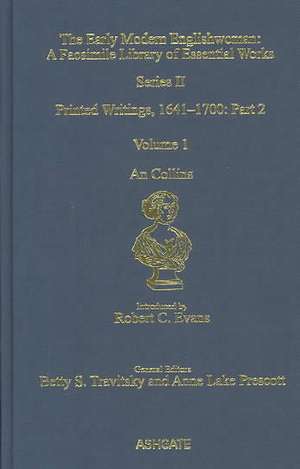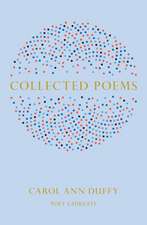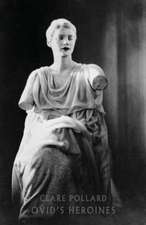An Collins: Printed Writings 1641–1700: Series II, Part Two, Volume 1: The Early Modern Englishwoman: A Facsimile Library of Essential Works & Printed Writings, 1641-1700: Series II, Part Two
Autor Robert C. Evansen Limba Engleză Hardback – 13 noi 2003
Preț: 759.72 lei
Preț vechi: 1024.78 lei
-26% Nou
Puncte Express: 1140
Preț estimativ în valută:
145.37€ • 152.16$ • 120.100£
145.37€ • 152.16$ • 120.100£
Carte tipărită la comandă
Livrare economică 01-15 aprilie
Preluare comenzi: 021 569.72.76
Specificații
ISBN-13: 9780754630937
ISBN-10: 0754630935
Pagini: 136
Dimensiuni: 123 x 186 mm
Greutate: 0.2 kg
Ediția:1
Editura: Taylor & Francis
Colecția Routledge
Seria The Early Modern Englishwoman: A Facsimile Library of Essential Works & Printed Writings, 1641-1700: Series II, Part Two
Locul publicării:Oxford, United Kingdom
ISBN-10: 0754630935
Pagini: 136
Dimensiuni: 123 x 186 mm
Greutate: 0.2 kg
Ediția:1
Editura: Taylor & Francis
Colecția Routledge
Seria The Early Modern Englishwoman: A Facsimile Library of Essential Works & Printed Writings, 1641-1700: Series II, Part Two
Locul publicării:Oxford, United Kingdom
Cuprins
Contents: Introductory note; Divine Songs and Meditacions; Appendix.
Descriere
An Collins' Divine Songs and Meditacions were first printed in a small octavo volume in London in 1653. The only extant copy is presently held at The Huntington Library and it is, therefore, this copy that is reproduced in this facsimile edition. It is an important text because it is one of the earliest volumes of collected poems by an English woman in the seventeenth century. The poems are especially intriguing because of the glimpses they provide into the life and mind of a woman writer during this period and because of the social, political, historical and religious contexts in which they are embedded. The precise identity of An Collins' remains a mystery, and scholars have had to rely on the Divine Songs and Meditacions for most of their understanding of its author, often drawing very different conclusions about her religious, social and political beliefs. To date critics have focused on the biographical and historical interest of the poems, but as Robert Evans highlights in his Introductory Note to the volume, these works also exhibit a rhetorical power and skill that merits further attention.




![Elizabeth Singer [Rowe]: Printed Writings 1641–1700: Series II, Part Two, Volume 7](https://i4.books-express.ro/bs/9780754630999/elizabeth-singer-rowe.jpg)
![Grace Norton [Gethin] and Frances (Freke) Norton: Printed Writings 1641–1700: Series II, Part Two, Volume 9](https://i2.books-express.ro/bs/9780754630920/grace-norton-gethin-and-frances-freke-norton.jpg)










